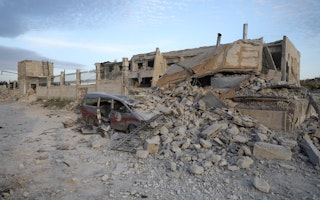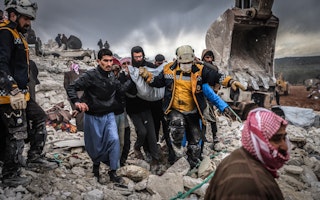Building a Better Tomorrow in Beirut
By Mona Fawaz

Lebanon’s major cities are full of vacant apartments. Banks, companies, investment entities, and wealthy individuals use the apartments to park capital, a situation exacerbated by Lebanon’s bank meltdown. This means that while urban dwellers suffer from a severe shortage of housing, more than a quarter of the apartments sit empty. Laws dating from the country’s pre-civil war days that exempt empty apartments from taxes only make matters worse—creating incentives for citizens to over-report empty apartments to avoid taxes. This deprives city authorities of much-needed revenue—funds that could be used to build sewage, water, and other direly needed services for the community. It also kills the life of the city by creating spaces devoid of activity, employment, and creativity.
This is the sort of challenge that led me to help launch the Beirut Urban Lab, a research space set up by the American University of Beirut in 2018 to produce scholarship on urbanization in Lebanon and work to advance “spatial justice”—the ways in which the built environment impacts social justice—through the establishment of just, inclusive and sustainable cities.
A unique signature of the Lab is its theme-specific online platforms to raise awareness on spatial injustice, like the apartment situation in Beirut. We produced a reliable base map of the city and surveyed the built environment, making it possible for researchers, activists, and public agents to have a solid base map on which to build knowledge. We used it to start a user-fed platform called “City of Tenants,” which informs citizens of rent values, improving access to housing. Another online platform, “Precarious Homes,” documents clusters where low-income tenants, mostly refugees, migrant workers, and impoverished Lebanese families, live with the permanent threat of eviction. We outline and analyze what makes these homes precarious.
Building on those efforts, we began lobbying to rescind tax exemption laws on vacant property. And we are starting a collaboration with one of the major international non-governmental organizations in Lebanon—a pilot project to recover empty buildings and convert them to affordable housing units, thereby upgrading neighborhoods in Beirut. We hope this pilot will pave the way for other urban transformations.
I have been interested in the concept of spatial justice for as long as I can remember. I entered college in 1990, the year Lebanon’s 15-year civil war ended. Like so many others, I believed we could rebuild the country differently and better. Architecture appealed as a career path, holding the promise that I could contribute to the reconstruction of my city.
Five years later, I found myself disillusioned. The post-civil war era in Lebanon was firmly anchored in neoliberal economics, focused on privatization, and the curricula and practice of architecture catered to high-end residential apartments, big museums, and exclusive buildings. My background in architecture did not give me the tools I needed to carry out my social commitment. I eventually went on to pursue a Master’s and PhD in City Planning in the United States. This training brought me closer to understanding the imperatives of spatial justice, what it meant to prioritize equity in the organization of the city and its conception.
I returned to Beirut in 2004 to teach at the American University and help establish a new program on city planning in the Department of Architecture and Design. During these years, I worked to shape a curriculum that centered people and urban planning, despite the fact that many of the pillars of the profession (e.g., the existence of a well-functioning state and a coherent sense of community) were non-existent. I worked with colleagues on research and advocacy aimed at influencing urban transformations in Beirut. In 2018, three colleagues and I were able to secure sufficient funding to set up the Beirut Urban Lab. Today, our lab comprises some 24 people, including graduate students, researchers, and the 4 co-directors. It’s a vibrant space.
The empty apartments are just one focus of our work. Another form of spatial injustice we address is the illegal occupation of coastlines. Property laws dating back to the 1920s in Lebanon declare the sea to be an inalienable public domain; it cannot be sold and citizens cannot be prevented from using it. But in the intervening decades, some oceanfront public lands were privatized, and, as the country became more of a beach destination for tourists, developers were able to carve out exemptions to these property laws to build beachfront resorts. Many of our decision-makers today helped fund the construction of such resorts, issuing themselves exemptions for the privilege.
In response, we brought together over 40 architects and urban designers to help develop a plan to protect the coast as a public ecological and social asset.
The 2020 Beirut blast had a huge impact on our work. We leveraged our existing research to help the city recover and help neighborhoods reclaim shared public spaces. We also initiated an observatory to improve awareness of recovery initiatives and the state of repairs.
Will change materialize overnight? No. The Lebanese currency lost 99 percent of its value in the last three years, and the country is still run by the same warlords responsible for the civil war that ended 30 years ago. But we work to make hope possible. We have offers of volunteer help from city planning and political science students all over the world who share our vision. Together, we can build an ecosystem of change, and play our part in making our cities more humane.
Beirut Urban Lab is a grantee of the Open Society Foundations.
Mona Fawaz is co-founder of the Beirut Urban Lab.


